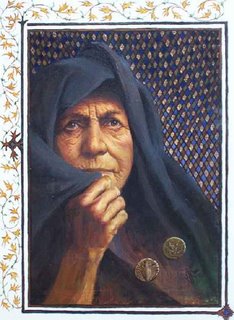 I've been thinking about this past Sunday's Gospel lesson, the story of the widow's mite -- a story beloved of sentimentalists and Stewardship Committees alike.
I've been thinking about this past Sunday's Gospel lesson, the story of the widow's mite -- a story beloved of sentimentalists and Stewardship Committees alike. But here's an idea: What if Jesus' primary purpose in noting the widow's gift wasn't to encourage church stewardship? What if it wasn't to honor the simple, trusting piety of the underclass?
What if Jesus simply meant what he said? -- that the woman had, proportionately speaking, given much more than all the rich persons who'd been parading to the Temple to publicly demonstrate their largesse?
Think about where this story lies in Mark's Gospel. Jesus has just gotten done criticizing the religious bigshots for their spiritual hubris; their love of money and what my grandma called Augenschein, or religiousity for show; their expectation of deference from the rest of the people. He's getting ready to predict the downfall of what he sees as a morally bankrupt Temple system.
Widows were non-entities in Jesus' society. Having lost their husbands, their male benefactors who gave them whatever meager status they had in a patriarchy, they were now dependent upon the not-always reliable goodwill of male in-laws, sons, brothers or other male relatives. If these men chose not to, or could not, continue supporting a widow, she was reduced to living off whatever alms she could obtain, or forced into prostitution. And, popular images of the widow in Jesus' story as a wizened old woman to the contrary, she may have been quite young. We see the same dynamic today in places like India, where widows -- some of them even children, married off as infants or toddlers -- are rejected by their families, ostracized, forced to live on the margins of society.
The great irony of the story, to me, is that a widow -- someone victimized by the circumstances of her life as an unpaired, unprotected female in a patriarchal society -- is helping to support one of the very oppressing forces in her life; a religious institution deaf to centuries of ringing prophetic calls for justice, occupying itself instead with legalistic fussbudgetry and business as usual in service to its own self-preservation.
And still she gave. Perhaps, as has been suggested, implicit in her giving was an entreaty to the God of Sarah and Abraham for help. Perhaps the tenacity of her faith, a faith that would lead her to donate her last two coins to God, was the edgy, attention-must-be-paid tenacity of the widow in Jesus' parable who wouldn't leave the judge alone until he heard her case.
It's interesting, why we feel so compelled to sentimentalize and spiritualize this story; perhaps it's because those of us in positions of wealth and privilege (which, broadly speaking, includes all of us in the affluent developed world) are so disconnected from the real suffering of the rest of humanity that we don't think about it or don't want to think about it.
I anticipate that one of my regular readers, who keeps me honest in my Lutheran theology, is going to query, "Where's the Gospel in your post?" That's a good question. I think the Gospel is in the person of Jesus -- the One who sees and hears and bears the suffering of the world; the One who, in the midst of the Temple's hustle and bustle, chose to turn his attention on this day to a "nobody" in the crowd...the One who made her a somebody, for the ages.
Artwork: "The Widow's Mite," by Louis Glanzman
2 comments:
When I read about her, I think about the church in Acts 4 and then think about what I give. I realize I am on a journey to give and share at that level of faith.
I'm a little late getting to this post. You're tracking something good here. Check out Ched Myers' commentary on Mark, "Say to This Mountain."
Peace,
Milton
Post a Comment